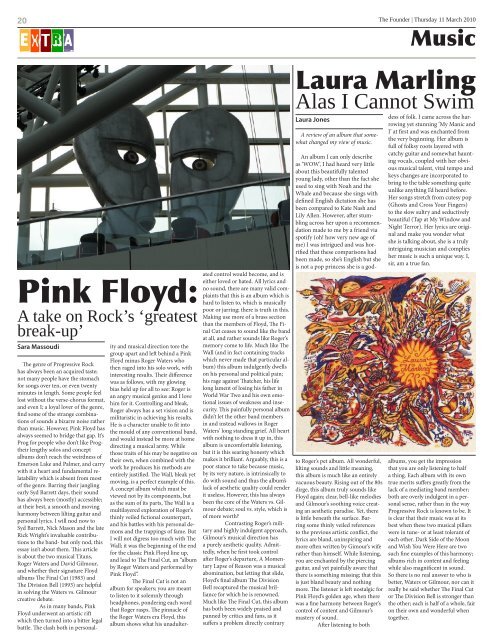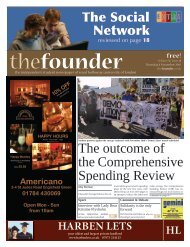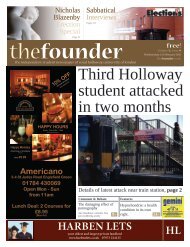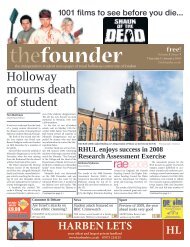HARBEN LETS HL Fashion Show Preview - The Founder
HARBEN LETS HL Fashion Show Preview - The Founder
HARBEN LETS HL Fashion Show Preview - The Founder
Create successful ePaper yourself
Turn your PDF publications into a flip-book with our unique Google optimized e-Paper software.
20<br />
E X T R A<br />
Pink Floyd:<br />
A take on Rock’s ‘greatest<br />
break-up’<br />
Sara Massoudi<br />
<strong>The</strong> genre of Progressive Rock<br />
has always been an acquired taste;<br />
not many people have the stomach<br />
for songs over ten, or even twenty<br />
minutes in length. Some people feel<br />
lost without the verse-chorus format,<br />
and even I; a loyal lover of the genre,<br />
find some of the strange combinations<br />
of sounds a bizarre noise rather<br />
than music. However, Pink Floyd has<br />
always seemed to bridge that gap. It’s<br />
Prog for people who don’t like Prog-<br />
their lengthy solos and concept<br />
albums don’t reach the weirdness of<br />
Emerson Lake and Palmer, and carry<br />
with it a heart and fundamental relatability<br />
which is absent from most<br />
of the genre. Barring their jangling<br />
early Syd Barrett days, their sound<br />
has always been (mostly) accessible;<br />
at their best, a smooth and moving<br />
harmony between lilting guitar and<br />
personal lyrics. I will nod now to<br />
Syd Barrett, Nick Mason and the late<br />
Rick Wright’s invaluable contributions<br />
to the band- but only nod, this<br />
essay isn’t about them. This article<br />
is about the two musical Titans,<br />
Roger Waters and David Gilmour,<br />
and whether their signature Floyd<br />
albums <strong>The</strong> Final Cut (1983) and<br />
<strong>The</strong> Division Bell (1993) are helpful<br />
in solving the Waters vs. Gilmour<br />
creative debate.<br />
As in many bands, Pink<br />
Floyd underwent an artistic rift<br />
which then turned into a bitter legal<br />
battle. <strong>The</strong> clash both in personal-<br />
ity and musical direction tore the<br />
group apart and left behind a Pink<br />
Floyd minus Roger Waters who<br />
then raged into his solo work, with<br />
interesting results. <strong>The</strong>ir difference<br />
was as follows, with my glowing<br />
bias held up for all to see: Roger is<br />
an angry musical genius and I love<br />
him for it. Controlling and bleak,<br />
Roger always has a set vision and is<br />
militaristic in achieving his results.<br />
He is a character unable to fit into<br />
the mould of any conventional band,<br />
and would instead be more at home<br />
directing a musical army. While<br />
those traits of his may be negative on<br />
their own, when combined with the<br />
work he produces his methods are<br />
entirely justified. <strong>The</strong> Wall, bleak yet<br />
moving, is a perfect example of this.<br />
A concept album which must be<br />
viewed not by its components, but<br />
as the sum of its parts, <strong>The</strong> Wall is a<br />
multilayered exploration of Roger’s<br />
thinly veiled fictional counterpart,<br />
and his battles with his personal demons<br />
and the trappings of fame. But<br />
I will not digress too much with <strong>The</strong><br />
Wall; it was the beginning of the end<br />
for the classic Pink Floyd line up,<br />
and lead to <strong>The</strong> Final Cut, an “album<br />
by Roger Waters and performed by<br />
Pink Floyd”.<br />
<strong>The</strong> Final Cut is not an<br />
album for speakers; you are meant<br />
to listen to it solemnly through<br />
headphones, pondering each word<br />
that Roger rasps. <strong>The</strong> pinnacle of<br />
the Roger Waters era Floyd, this<br />
album shows what his unadulter-<br />
ated control would become, and is<br />
either loved or hated. All lyrics and<br />
no sound, there are many valid complaints<br />
that this is an album which is<br />
hard to listen to, which is musically<br />
poor or jarring; there is truth in this.<br />
Making use more of a brass section<br />
than the members of Floyd, <strong>The</strong> Final<br />
Cut ceases to sound like the band<br />
at all, and rather sounds like Roger’s<br />
memory come to life. Much like <strong>The</strong><br />
Wall (and in fact containing tracks<br />
which never made that particular album)<br />
this album indulgently dwells<br />
on his personal and political pain;<br />
his rage against Thatcher, his life<br />
long lament of losing his father in<br />
World War Two and his own emotional<br />
issues of weakness and insecurity.<br />
This painfully personal album<br />
didn’t let the other band members<br />
in and instead wallows in Roger<br />
Waters’ long standing grief. All heart<br />
with nothing to dress it up in, this<br />
album is uncomfortable listening,<br />
but it is this searing honesty which<br />
makes it brilliant. Arguably, this is a<br />
poor stance to take because music,<br />
by its very nature, is intrinsically to<br />
do with sound and thus the album’s<br />
lack of aesthetic quality could render<br />
it useless. However, this has always<br />
been the core of the Waters vs. Gilmour<br />
debate; soul vs. style, which is<br />
of more worth?<br />
Contrasting Roger’s military<br />
and highly indulgent approach,<br />
Gilmour’s musical direction has<br />
a purely aesthetic quality. Admittedly,<br />
when he first took control<br />
after Roger’s departure, A Momentary<br />
Lapse of Reason was a musical<br />
abomination, but letting that slide,<br />
Floyd’s final album <strong>The</strong> Division<br />
Bell recaptured the musical brilliance<br />
for which he is renowned.<br />
Much like <strong>The</strong> Final Cut, this album<br />
has both been widely praised and<br />
panned by critics and fans, as it<br />
suffers a problem directly contrary<br />
<strong>The</strong> <strong>Founder</strong> | Thursday 11 March 2010<br />
Laura Marling<br />
Alas I Cannot Swim<br />
Laura Jones<br />
A review of an album that somewhat<br />
changed my view of music.<br />
An album I can only describe<br />
as ‘WOW’, I had heard very little<br />
about this beautifully talented<br />
young lady, other than the fact she<br />
used to sing with Noah and the<br />
Whale and because she sings with<br />
defined English dictation she has<br />
been compared to Kate Nash and<br />
Lily Allen. However, after stumbling<br />
across her upon a recommendation<br />
made to me by a friend via<br />
spotify (oh! how very new age of<br />
me) I was intrigued and was horrified<br />
that these comparisons had<br />
been made, so she’s English but she<br />
is not a pop princess she is a god-<br />
to Roger’s pet album. All wonderful,<br />
lilting sounds and little meaning,<br />
this album is much like an entirely<br />
vacuous beauty. Rising out of the 80s<br />
dirge, this album truly sounds like<br />
Floyd again; clear, bell-like melodies<br />
and Gilmour’s soothing voice creating<br />
an aesthetic paradise. Yet, there<br />
is little beneath the surface. Barring<br />
some thinly veiled references<br />
to the previous artistic conflict, the<br />
lyrics are bland, uninspiring and<br />
more often written by Gimour’s wife<br />
rather than himself. While listening,<br />
you are enchanted by the piercing<br />
guitar, and yet painfully aware that<br />
there is something missing; that this<br />
is just bland beauty and nothing<br />
more. <strong>The</strong> listener is left nostalgic for<br />
Pink Floyd’s golden age, when there<br />
was a fine harmony between Roger’s<br />
control of content and Gilmour’s<br />
mastery of sound.<br />
After listening to both<br />
Music<br />
dess of folk. I came across the harrowing<br />
yet stunning ‘My Manic and<br />
I’ at first and was enchanted from<br />
the very beginning. Her album is<br />
full of folksy roots layered with<br />
catchy guitar and somewhat haunting<br />
vocals, coupled with her obvious<br />
musical talent, vital tempo and<br />
keys changes are incorporated to<br />
bring to the table something quite<br />
unlike anything I’d heard before.<br />
Her songs stretch from cutesy pop<br />
(Ghosts and Cross Your Fingers)<br />
to the slow sultry and seductively<br />
beautiful (Tap at My Window and<br />
Night Terror). Her lyrics are original<br />
and make you wonder what<br />
she is talking about, she is a truly<br />
intriguing musician and complies<br />
her music is such a unique way. I,<br />
sir, am a true fan.<br />
albums, you get the impression<br />
that you are only listening to half<br />
a thing. Each album with its own<br />
true merits suffers greatly from the<br />
lack of a mediating band member;<br />
both are overly indulgent in a personal<br />
sense, rather than in the way<br />
Progressive Rock is known to be. It<br />
is clear that their music was at its<br />
best when these two musical pillars<br />
were in tune- or at least tolerant of<br />
each other. Dark Side of the Moon<br />
and Wish You Were Here are two<br />
such fine examples of this harmony;<br />
albums rich in content and feeling<br />
while also magnificent in sound.<br />
So there is no real answer to who is<br />
better, Waters or Gilmour, nor can it<br />
really be said whether <strong>The</strong> Final Cut<br />
or <strong>The</strong> Division Bell is stronger than<br />
the other; each is half of a whole, fair<br />
on their own and wonderful when<br />
together.














